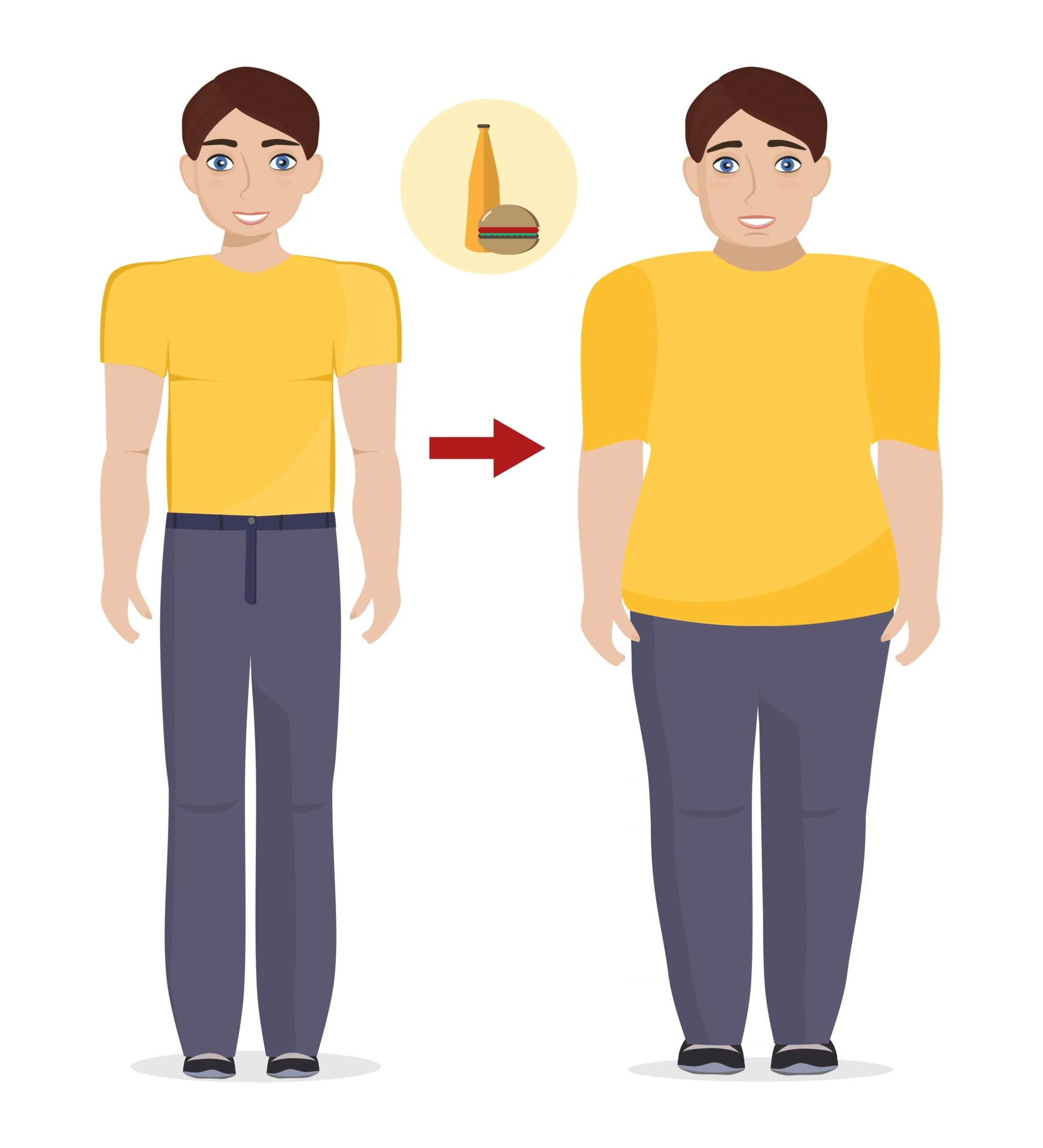Weight Gain Calculator
Enter the Weight Gain Calculator, a powerful tool designed to provide individuals with the necessary insights and strategies to achieve their weight gain goals effectively and safely.
This innovative calculator takes into account various factors, including age, height, current weight, target weight, activity level, and time frame, to offer personalized recommendations tailored to each individual’s unique needs.
Table of Contents
Weight Gain Calculator
This weight gain calculator is a useful tool for figuring out how many calories you need to gain weight each day. Additionally, receive recommendations for high-calorie foods to help you plan your diet for weight gain.
The basic science underlying weight gain is this: consume more calories than your body is capable of burning. Of course, it’s easier said than done unless you are aware of the precise number of calories you must consume each day in order to gain weight, and what a healthy diet for weight gain requires.
Weight input:
Enter your present weight, making sure it falls within the range of 15 kg (33 lbs) to 700 kg (1,543 lbs). This range is set to keep the precision and dependability of calculations, as extremely low or high weights may bring complexities and might conflict with standard health guidelines.
Age input:
Input your age in years. Note that this calculator was created for adults over 18 while under 120 years old.
Activity level:
Select your activity level from little, light, moderate, hard, physical job/intense physical activity, or competitive athlete.
Target weight:
Continue to set the weight you want to reach your goal. Please make sure that the desired weight is between 20 kg (44 lbs) and 300 kg (661 lbs).
Weight gain rate: Determine how quickly you would like to acquire weight. A regular pace would be 0.5 kg or 1 lb per week; a tighter approach would be 1 kilogram or 2 lbs per week.
Options for graph display: Select if the graph of calorie intake, weight change, or both should be shown.
Outcomes: Upon inputting the above-mentioned data, you will ascertain the number of calories required to sustain your present weight. In addition, a graph showing how your weight will rise over time and how your calorie intake should vary each week will be produced by the calculator.
Take a 28-year-old lady, for instance, who is 170 cm (5’5”) tall and weights 60 kg (132 lbs) at the moment. She works out one or two times a week, and her goal is to gain 0.5 kg or 1 lb per week, which is a typical, healthy weight increase until she reaches her goal of 65 kg (143 lbs).
The calculation indicates that she requires about 1906 calories per day to maintain her present weight. But if she wants to hit her goals, the recommended daily caloric intake for the first week is 2407 kcal, and by the end of week 10, it rises to 2477 kcal.
She is predicted to weigh around 60.5 kg (133.4 lbs) after the first week and to achieve her target weight of 65 kg (143 lbs) by week 10.
Are you looking for advice on how to put on weight? Then continue reading to provide yourself with the knowledge required for a successful weight-gain journey.
The Risks of Being Underweight
It’s common knowledge that having a body mass index that is too high increases the risk of certain conditions, such as diabetes and cardiovascular disease. But is being underweight also harmful?
The BMI calculator is also a useful tool for you to use.
Well, it is! Being underweight comes with a number of risks:
- Malnutrition
- Vitamin deficiencies
- Osteoporosis
- Decreased immune function
- Decreased fertility
- Increased risk for complications from surgery.
How can one gain weight?
It may seem obvious to say that you must consume more calories than you expend in order to answer this issue. It’s easier said than done, though. A high total daily energy expenditure (TDEE) may make it challenging to ingest the necessary number of calories. This may be the case if you’re training for another sport, jogging, swimming, cycling, or doing any other intense physical activity.
To ensure that you are getting adequate micro and macronutrients, follow these tips:
- Don’t miss meals; Make an effort to incorporate wholesome, high-energy snacks (such as oat bars or almonds) into your meal schedule;
- Add additional calories to your meals by sprinkling on nuts, seeds, and/or healthful dressings;
- If alcohol makes you feel less hungry, avoid having it with your meal and make an effort to track how many calories you ingest.
What is the calorie need for weight gain?
You must first receive more calories than you spend on overall energy.
TDEE is dependent on several variables, such as:
The basal metabolism is dependent upon several characteristics, such as age, sex, height, weight, fat mass, and fat-free mass. The BMR calculator may be utilized to compute it by utilizing the Mifflin-St. Jeor equation; The metabolic reaction to the consumed food, which is the energy required for food ingestion and digestion; and Physical activity, which is subject to daily fluctuations. This is TDEE’s second-largest component after BMR; physiological state includes things like growth, pregnancy, nursing, etc.
You must include extra calories once you have determined how much you burn each day.
An estimated 7000 kcal is required for every kilogram or two pounds that you acquire in a week. Thus, if you consume an additional 1000 kcal each day, you should gain 1 kg (2 pounds) in just one week.
Did you check out the weight gain calorie calculator already? You may use it to calculate how many calories you need to gain weight each day by using an estimate of your personal daily energy expenditure. If not, simply give it a go!
Remarks and cautions
Our goal is to provide the most accurate and dependable Omni Calculators available. Still, no technology can ever take the place of an individualized assessment from a dietician. This website’s content is provided solely for informative reasons and isn’t meant to take the place of medical advice. For specific advice on managing your weight or health issues, always see your healthcare practitioner. It’s important to understand refeeding syndrome, especially if you have a history of malnutrition or an eating problem and are thinking about changing your calorie intake to gain weight.
Refeeding syndrome can happen when a person goes from a severe undernourishment state to one of normal or increased calorie intake. It is a potentially dangerous and serious condition. Before making any big dietary changes, it is crucial to speak with a healthcare provider if you are trying to recover from an eating problem or malnutrition and want to put on weight.
FAQ
It is estimated that around 7000 kcal are needed to acquire 1 kg or 2 pounds in a week. This suggests that if you consume an extra 1000 kcal per day, you should gain 1 kg (2 pounds) in a week.
To gain 4 kg in 20 days:
Increase daily calorie intake.
Focus on nutrient-rich foods.
Include strength training in your exercise routine.
Eat regular meals and snacks.
Ensure adequate rest and hydration.
The simplest formula for calculating weight gain or loss is calories consumed minus calories generated. A positive result means more weight gained, while a negative one means less weight lost.
It is possible, yes. People generally require 1200 calories or more per day to maintain good health. You must consume 1000 calories extra every day in order to gain 5 kg of weight in a month. It equals 1200 Cal in total.
To gain weight naturally:
Eat more calories than you burn.
Give priority to nutrient-dense foods such as complex carbs, healthy fats, and lean meats.
Incorporate workouts for strength training to increase muscular mass.
Consume frequent meals and snacks all day long.
Get enough rest and sleep for proper recovery and growth.







